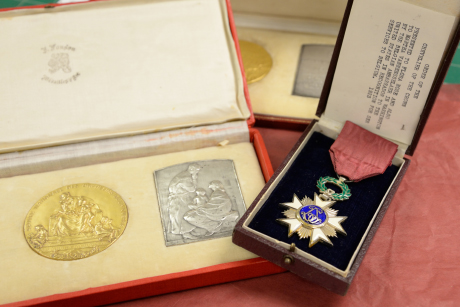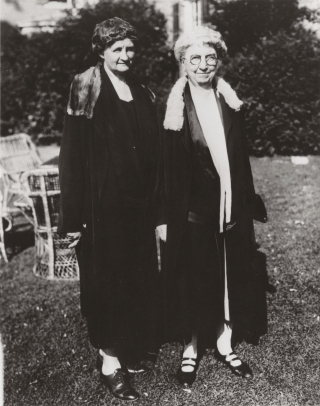At Reunion, honoring Cornell's post-WWI work in Belgium
By Ted Boscia

As Cornell prepares to launch its sesquicentennial celebration, the College of Human Ecology is getting into the spirit by restoring a significant university artifact and holding a 150th birthday party at Reunion 2014 for one of its founding figures.
At the Human Ecology alumni breakfast June 7, Alan Mathios, the Rebecca Q. and James C. Morgan Dean, will lead a tribute to Martha Van Rensselaer, an original co-director of Cornell’s then-College of Home Economics, who was born June 21, 1864.
To mark the occasion, Cornell Library’s Department of Conservation has restored a collection of medals awarded to Van Rensselaer and college co-founder Flora Rose for their work on child welfare and women’s education in Belgium following World War I. The medals will be displayed June 7 from 10:30 a.m. to 5 p.m. as part of a showcase of Cornell Archives treasures hosted by the Division of Rare and Manuscript Collections, Level 2B, Kroch Library.
Van Rensselaer and Rose, women’s rights advocates and leaders of the home economics movement, went overseas in 1923 at the request of the Commission for Relief in Belgium, an effort led by Herbert Hoover that delivered some 5 million tons of food to Belgian citizens during the German occupation. Rose sailed to Europe in the spring of 1923, leading a nutrition survey of nearly 5,000 Belgian children and teens to study their health in the war’s aftermath. Van Rensselaer, honored that year as one of America’s 12 greatest women by the League of Women Voters, followed in June. She met the Belgian queen and other leaders in Brussels and toured local schools to develop recommendations to educate women in the field of home economics.

For their efforts, Belgium’s King Albert awarded Van Rensselaer and Rose with the insignia of Chevalier of the Order of the Crown, given in December 1925 in Washington, D.C., by the Belgian ambassador. The prior year, the Belgian government bestowed a set of six medals on the pair for their work with undernourished children.
Nearly 90 years later, the medals have aged well, requiring only a light polish, but their display boxes were falling apart. In the basement of Olin Library, book conservator Michele Brown restored one of the cases and built two clamshell boxes to hold all the items. The boxes are lined with archival paper to protect the contents and keep the medals from shifting in storage.
“It’s a challenging job,” Brown said. “The boxes were constructed in a way that opening them puts a lot of wear and stress on them. I wanted to maintain the appearance of the original, damaged box but reinforce it so it could be handled safely. They are beautiful medals and part of Cornell history.”
When not on display, the medals will be stored in the temperature and humidity controlled vault in the Division of Rare and Manuscript Collections. The new cases provide for more convenient access for Reunion and other events and presentations, Brown said.
“To commemorate Cornell’s sesquicentennial and the 100th anniversary of the start of WWI, it is fitting that we showcase these medals,” said Human Ecology archivist Eileen Keating. “They symbolize the far-reaching influence Martha and Flora’s pioneering work had not only in New York state, but in the nation and beyond. The practical knowledge of home economics that they shared with the people of Belgium helped in the famine relief and rebuilding efforts after the war.”
Ted Boscia is director of communications and media for the College of Human Ecology.
Media Contact
Get Cornell news delivered right to your inbox.
Subscribe